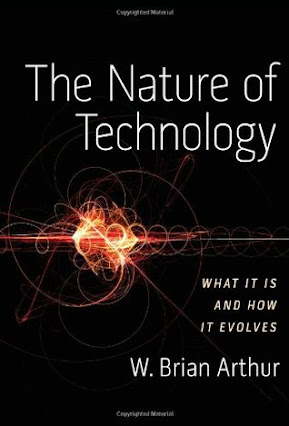S1E6: In the Footnotes - Defining Technology Part 2
Some more resources on Brian Arthur.
http://tuvalu.santafe.edu/~wbarthur/index.html
Page 28.
The first and most basic one is that a technology is a means to fulfill a human purpose. For some technologies-oil refining-the purpose is explicit. For others- the computer-the purpose may be hazy, multiple, and changing. As a means, a technology may be a method or process or device: a particular speech recognition algorithm, or a filtration process in chemical engineering, or a diesel engine. it may be simple: a roller bearing. Or it may be complicated: a wavelength division multiplexer. It may be material: an electrical generator. Or it may be non-material: a digital compression algorithm. Whichever it is, it is always a means to carry out a human purpose.
The second definition I will allow is a plural one: technology as an assemblage of practices and components. This covers technologies such as electronics or biotechnology that are collections or toolboxes of individual technologies and practices. Strictly speaking, we should call these bodies of technology. But this plural usage is widespread, so I will allow it here.
I will also allow a third meaning. This is technology as the entire collection of devices and engineering practices available to a culture. Here we are back to the Oxford's collection of mechanical arts, or as Webster's puts it, "The totality of the means employed by a people to provide itself with the objects of material culture." We use this collective meaning when we blame "technology" for speeding up our lives, or talk of "technology" as a hope for mankind. Sometimes this meaning shades off into technology as a collective activity, as in "technology is what Silicon Valley is all about." I will allow this too as a variant of technology's collective meaning. The technology thinker Kevin Kelly calls this totality the "technium," and I like this word. But in this book I prefer to simply use "technology" for this because that reflects common use.
The reason we need three meanings is that each points to technology in a different sense, a different category, from the others. Each category comes into being differently and evolves differently. A technology-singular-the steam engine-originates as a new concept and develops by modifying its internal parts. A technology-plural-electronics-comes into being by building around certain phenomena and components and develops by changing its parts and practices. And technology-general, the whole collection of all technologies that have ever existed past and present, originates from the use of natural phenomena and builds up organically with new elements forming by combination from old ones.”
― The Nature of Technology: What It Is and How It Evolves
Technologies 'fill' needs and 'create' needs. Once we started down the path of agriculture humans have need motive power to plough and to crush the grain at a bare minimum. Oxen power for both was good enough to start but eventually that led to the water wheel for crushing which eventually gave way to steam power for crushing and ploughing.
Technologies evolve - change over time even when the purpose stays relatively the same. Look at how musical instruments change as people prefer different sounds. Sometimes, with say the flute, the changes are very minimal.
